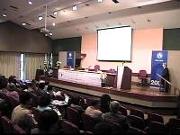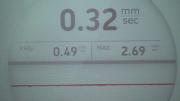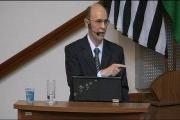Pesquisa realizada pelo termo "doing"
- 1
- 2

17th International Input-Output Conference
On behalf of the Local Organizing Committee, I am delighted to welcome you to this, the 17th International Input-Output Conference of the International Input-Output Association.
The Local Organizing Committee at the Department of Economics,
School of Economics, Business and Accountancy, at the University of São Paulo (USP) is proud to host the 17th International Input-Output Conference for the first time in Brazil. A team of professors and researchers throughout Brazil has worked hard to put together a quality program, and the support team at USP has been doing a superb job to make sure that this will be an event to remember.
São Paulo is one of the largest cities in the world, with over 18 million people in its metropolitan area. It hosts around 15% of Brazilian GDP and is the heart of the Brazilian economy. It is metropolitan in nature, with a diversified population, composed of Italians, Germans, Japanese (the largest community outside Japan), Lebanese, Chinese, Koreans, Spaniards and, of course, Portuguese.
USP is considered to be the most important Brazilian University. Its scientific production amounts to 28% of the whole production in Brazil, placing USP among the top three higher-education institutions in Latin America and among the top 200 in the world (The Times Higher Education Supplement).
The Department of Economics at USP currently has around one thousand undergraduate and graduate students who enjoy the privilege of having a complete university facility at their disposal with no tuition fees. They make a highly qualified student body as a result of the highly competitive entrance selection process. Students at the Department of Economics have also at their disposal first-rate faculty: more than 70 professors holding a Ph.D., most of them obtained abroad at leading universities.
With around 250 papers submitted by 430 authors and coauthors from 48 different countries, of which 162 papers were chosen for presentation, it is possible to forecast that this will be a stimulating meeting with quality papers and debates, making it possible to go from data discussions, passing through advances in theory, to culminate into Leontief´s goal of having a better understanding of the economic, social, environmental and political reality of the World that we live.
I do hope that you could share with us the high hopes of this meeting and at the same time, also share a little of the natural beauties of Brazil.
Joaquim J.M. Guilhoto
Chair LOC
Duração: 01:39:32

17th International Input-Output Conference of the International Input-Output Association.
On behalf of the Local Organizing Committee, I am delighted to welcome you to this, the 17th International Input-Output Conference of the International Input-Output Association.
The Local Organizing Committee at the Department of Economics,
School of Economics, Business and Accountancy, at the University of São Paulo (USP) is proud to host the 17th International Input-Output Conference for the first time in Brazil. A team of professors and researchers throughout Brazil has worked hard to put together a quality program, and the support team at USP has been doing a superb job to make sure that this will be an event to remember.
São Paulo is one of the largest cities in the world, with over 18 million people in its metropolitan area. It hosts around 15% of Brazilian GDP and is the heart of the Brazilian economy. It is metropolitan in nature, with a diversified population, composed of Italians, Germans, Japanese (the largest community outside Japan), Lebanese, Chinese, Koreans, Spaniards and, of course, Portuguese.
USP is considered to be the most important Brazilian University. Its scientific production amounts to 28% of the whole production in Brazil, placing USP among the top three higher-education institutions in Latin America and among the top 200 in the world (The Times Higher Education Supplement).
The Department of Economics at USP currently has around one thousand undergraduate and graduate students who enjoy the privilege of having a complete university facility at their disposal with no tuition fees. They make a highly qualified student body as a result of the highly competitive entrance selection process. Students at the Department of Economics have also at their disposal first-rate faculty: more than 70 professors holding a Ph.D., most of them obtained abroad at leading universities.
With around 250 papers submitted by 430 authors and coauthors from 48 different countries, of which 162 papers were chosen for presentation, it is possible to forecast that this will be a stimulating meeting with quality papers and debates, making it possible to go from data discussions, passing through advances in theory, to culminate into Leontief´s goal of having a better understanding of the economic, social, environmental and political reality of the World that we live.
I do hope that you could share with us the high hopes of this meeting and at the same time, also share a little of the natural beauties of Brazil.
Duração: 01:27:40

17th International Input-Output Conference of the International Input-Output Association. 17/07/09
On behalf of the Local Organizing Committee, I am delighted to welcome you to this, the 17th International Input-Output Conference of the International Input-Output Association.
The Local Organizing Committee at the Department of Economics,
School of Economics, Business and Accountancy, at the University of São Paulo (USP) is proud to host the 17th International Input-Output Conference for the first time in Brazil. A team of professors and researchers throughout Brazil has worked hard to put together a quality program, and the support team at USP has been doing a superb job to make sure that this will be an event to remember.
São Paulo is one of the largest cities in the world, with over 18 million people in its metropolitan area. It hosts around 15% of Brazilian GDP and is the heart of the Brazilian economy. It is metropolitan in nature, with a diversified population, composed of Italians, Germans, Japanese (the largest community outside Japan), Lebanese, Chinese, Koreans, Spaniards and, of course, Portuguese.
USP is considered to be the most important Brazilian University. Its scientific production amounts to 28% of the whole production in Brazil, placing USP among the top three higher-education institutions in Latin America and among the top 200 in the world (The Times Higher Education Supplement).
The Department of Economics at USP currently has around one thousand undergraduate and graduate students who enjoy the privilege of having a complete university facility at their disposal with no tuition fees. They make a highly qualified student body as a result of the highly competitive entrance selection process. Students at the Department of Economics have also at their disposal first-rate faculty: more than 70 professors holding a Ph.D., most of them obtained abroad at leading universities.
With around 250 papers submitted by 430 authors and coauthors from 48 different countries, of which 162 papers were chosen for presentation, it is possible to forecast that this will be a stimulating meeting with quality papers and debates, making it possible to go from data discussions, passing through advances in theory, to culminate into Leontief´s goal of having a better understanding of the economic, social, environmental and political reality of the World that we live.
I do hope that you could share with us the high hopes of this meeting and at the same time, also share a little of the natural beauties of Brazil.
Duração: 01:53:16

17º International Input-output Conference, 13 a 17 de julho
On behalf of the Local Organizing Committee, I am delighted to welcome you to this, the 17th International Input-Output Conference of the International Input-Output Association.
The Local Organizing Committee at the Department of Economics,
School of Economics, Business and Accountancy, at the University of São Paulo (USP) is proud to host the 17th International Input-Output Conference for the first time in Brazil. A team of professors and researchers throughout Brazil has worked hard to put together a quality program, and the support team at USP has been doing a superb job to make sure that this will be an event to remember.
São Paulo is one of the largest cities in the world, with over 18 million people in its metropolitan area. It hosts around 15% of Brazilian GDP and is the heart of the Brazilian economy. It is metropolitan in nature, with a diversified population, composed of Italians, Germans, Japanese (the largest community outside Japan), Lebanese, Chinese, Koreans, Spaniards and, of course, Portuguese.
USP is considered to be the most important Brazilian University. Its scientific production amounts to 28% of the whole production in Brazil, placing USP among the top three higher-education institutions in Latin America and among the top 200 in the world (The Times Higher Education Supplement).
The Department of Economics at USP currently has around one thousand undergraduate and graduate students who enjoy the privilege of having a complete university facility at their disposal with no tuition fees. They make a highly qualified student body as a result of the highly competitive entrance selection process. Students at the Department of Economics have also at their disposal first-rate faculty: more than 70 professors holding a Ph.D., most of them obtained abroad at leading universities.
With around 250 papers submitted by 430 authors and coauthors from 48 different countries, of which 162 papers were chosen for presentation, it is possible to forecast that this will be a stimulating meeting with quality papers and debates, making it possible to go from data discussions, passing through advances in theory, to culminate into Leontief´s goal of having a better understanding of the economic, social, environmental and political reality of the World that we live.
I do hope that you could share with us the high hopes of this meeting and at the same time, also share a little of the natural beauties of Brazil.
Duração: 01:33:23

1st Workshop in Physiology Education - Part 1
1st Workshop in Physiology Education
ADInstruments Brasil
Thursday, August 7, 2014 at 8:30 AM - Friday, August 8, 2014 at 6:00 PM
Auditório Luiz Rachid Trabulsi
Instituto de Ciências Biomédicas
Universidade de São Paulo
São Paulo, SP, Brazil
Prof. Dr. Antônio Carlos Hernandes - Pró-reitor de Graduação da Universidade de São Paulo (USP).
Prof. Dr. Jackson Cioni Bittencourt - Diretor do Instituto de Ciências Biomédicas da USP (ICB-USP).
Profa. Dra. Maria Tereza Nunes - Coordenadora do Evento e Membro da Comissão de Apoio Pedagógico da Pró-reitora de Graduação.
Palestrantes:
Tony MacKnight - ADInstruments
"Using New Technologies to Transform Education"
“Practicing Physiology using AD Instruments Lab tutor”
Pennelope Hansen - Intl.University of Professional Studies / IUPS
“Physiology’s Hidden Curriculum”
“Discovering and making use of your hidden curriculum”
“Truly, Madly, Deeply”: How to love an integrated physiology curriculum.
“Designing Multidisciplinary Integrated Curriculum Units”
Camilo Lellis Santos - UNIFESP
“Teaching Exercise Physiology using mobile apps and tablets”
“Use of multimedia in teaching”
Maria Tereza Nunes - USP ICB
“Working models of active learning in classrooms with many students and a single teacher”
“Ways to increase active learning in lectures”
Loreto Pamela Véliz García - PUC Chile
“Strengthening the teaching of Experimental Physiology at the University using LabTutor”
“Practicing Physiology using Lab Tutor”
Günther Gehlen - Inst. de Ciências da Saúde - ICS / Feevale - "Application of LabTutor, from teaching to academic research"
“Doing and reporting educational research” (open section for participants)"
Round table with all the guests
Duração: 01:19:41

1st Workshop in Physiology Education - Part 2
1st Workshop in Physiology Education
ADInstruments Brasil
Thursday, August 7, 2014 at 8:30 AM - Friday, August 8, 2014 at 6:00 PM
Auditório Luiz Rachid Trabulsi
Instituto de Ciências Biomédicas
Universidade de São Paulo
São Paulo, SP, Brazil
Prof. Dr. Antônio Carlos Hernandes - Pró-reitor de Graduação da Universidade de São Paulo (USP).
Prof. Dr. Jackson Cioni Bittencourt - Diretor do Instituto de Ciências Biomédicas da USP (ICB-USP).
Profa. Dra. Maria Tereza Nunes - Coordenadora do Evento e Membro da Comissão de Apoio Pedagógico da Pró-reitora de Graduação.
Palestrantes:
Tony MacKnight - ADInstruments
"Using New Technologies to Transform Education"
“Practicing Physiology using AD Instruments Lab tutor”
Pennelope Hansen - Intl.University of Professional Studies / IUPS
“Physiology’s Hidden Curriculum”
“Discovering and making use of your hidden curriculum”
“Truly, Madly, Deeply”: How to love an integrated physiology curriculum.
“Designing Multidisciplinary Integrated Curriculum Units”
Camilo Lellis Santos - UNIFESP
“Teaching Exercise Physiology using mobile apps and tablets”
“Use of multimedia in teaching”
Maria Tereza Nunes - USP ICB
“Working models of active learning in classrooms with many students and a single teacher”
“Ways to increase active learning in lectures”
Loreto Pamela Véliz García - PUC Chile
“Strengthening the teaching of Experimental Physiology at the University using LabTutor”
“Practicing Physiology using Lab Tutor”
Günther Gehlen - Inst. de Ciências da Saúde - ICS / Feevale - "Application of LabTutor, from teaching to academic research"
“Doing and reporting educational research” (open section for participants)"
Round table with all the guests
Duração: 01:23:30

1st Workshop in Physiology Education - Part 3
1st Workshop in Physiology Education
ADInstruments Brasil
Thursday, August 7, 2014 at 8:30 AM - Friday, August 8, 2014 at 6:00 PM
Auditório Luiz Rachid Trabulsi
Instituto de Ciências Biomédicas
Universidade de São Paulo
São Paulo, SP, Brazil
Prof. Dr. Antônio Carlos Hernandes - Pró-reitor de Graduação da Universidade de São Paulo (USP).
Prof. Dr. Jackson Cioni Bittencourt - Diretor do Instituto de Ciências Biomédicas da USP (ICB-USP).
Profa. Dra. Maria Tereza Nunes - Coordenadora do Evento e Membro da Comissão de Apoio Pedagógico da Pró-reitora de Graduação.
Palestrantes:
Tony MacKnight - ADInstruments
"Using New Technologies to Transform Education"
“Practicing Physiology using AD Instruments Lab tutor”
Pennelope Hansen - Intl.University of Professional Studies / IUPS
“Physiology’s Hidden Curriculum”
“Discovering and making use of your hidden curriculum”
“Truly, Madly, Deeply”: How to love an integrated physiology curriculum.
“Designing Multidisciplinary Integrated Curriculum Units”
Camilo Lellis Santos - UNIFESP
“Teaching Exercise Physiology using mobile apps and tablets”
“Use of multimedia in teaching”
Maria Tereza Nunes - USP ICB
“Working models of active learning in classrooms with many students and a single teacher”
“Ways to increase active learning in lectures”
Loreto Pamela Véliz García - PUC Chile
“Strengthening the teaching of Experimental Physiology at the University using LabTutor”
“Practicing Physiology using Lab Tutor”
Günther Gehlen - Inst. de Ciências da Saúde - ICS / Feevale - "Application of LabTutor, from teaching to academic research"
“Doing and reporting educational research” (open section for participants)"
Round table with all the guests
Duração: 01:01:42

1st Workshop in Physiology Education - Part 4
1st Workshop in Physiology Education
ADInstruments Brasil
Thursday, August 7, 2014 at 8:30 AM - Friday, August 8, 2014 at 6:00 PM
Auditório Luiz Rachid Trabulsi
Instituto de Ciências Biomédicas
Universidade de São Paulo
São Paulo, SP, Brazil
Prof. Dr. Antônio Carlos Hernandes - Pró-reitor de Graduação da Universidade de São Paulo (USP).
Prof. Dr. Jackson Cioni Bittencourt - Diretor do Instituto de Ciências Biomédicas da USP (ICB-USP).
Profa. Dra. Maria Tereza Nunes - Coordenadora do Evento e Membro da Comissão de Apoio Pedagógico da Pró-reitora de Graduação.
Palestrantes:
Tony MacKnight - ADInstruments
"Using New Technologies to Transform Education"
“Practicing Physiology using AD Instruments Lab tutor”
Pennelope Hansen - Intl.University of Professional Studies / IUPS
“Physiology’s Hidden Curriculum”
“Discovering and making use of your hidden curriculum”
“Truly, Madly, Deeply”: How to love an integrated physiology curriculum.
“Designing Multidisciplinary Integrated Curriculum Units”
Camilo Lellis Santos - UNIFESP
“Teaching Exercise Physiology using mobile apps and tablets”
“Use of multimedia in teaching”
Maria Tereza Nunes - USP ICB
“Working models of active learning in classrooms with many students and a single teacher”
“Ways to increase active learning in lectures”
Loreto Pamela Véliz García - PUC Chile
“Strengthening the teaching of Experimental Physiology at the University using LabTutor”
“Practicing Physiology using Lab Tutor”
Günther Gehlen - Inst. de Ciências da Saúde - ICS / Feevale - "Application of LabTutor, from teaching to academic research"
“Doing and reporting educational research” (open section for participants)"
Round table with all the guests
Duração: 01:22:29

1st Workshop in Physiology Education - Part 5
1st Workshop in Physiology Education
ADInstruments Brasil
Thursday, August 7, 2014 at 8:30 AM - Friday, August 8, 2014 at 6:00 PM
Auditório Luiz Rachid Trabulsi
Instituto de Ciências Biomédicas
Universidade de São Paulo
São Paulo, SP, Brazil
Prof. Dr. Antônio Carlos Hernandes - Pró-reitor de Graduação da Universidade de São Paulo (USP).
Prof. Dr. Jackson Cioni Bittencourt - Diretor do Instituto de Ciências Biomédicas da USP (ICB-USP).
Profa. Dra. Maria Tereza Nunes - Coordenadora do Evento e Membro da Comissão de Apoio Pedagógico da Pró-reitora de Graduação.
Palestrantes:
Tony MacKnight - ADInstruments
"Using New Technologies to Transform Education"
“Practicing Physiology using AD Instruments Lab tutor”
Pennelope Hansen - Intl.University of Professional Studies / IUPS
“Physiology’s Hidden Curriculum”
“Discovering and making use of your hidden curriculum”
“Truly, Madly, Deeply”: How to love an integrated physiology curriculum.
“Designing Multidisciplinary Integrated Curriculum Units”
Camilo Lellis Santos - UNIFESP
“Teaching Exercise Physiology using mobile apps and tablets”
“Use of multimedia in teaching”
Maria Tereza Nunes - USP ICB
“Working models of active learning in classrooms with many students and a single teacher”
“Ways to increase active learning in lectures”
Loreto Pamela Véliz García - PUC Chile
“Strengthening the teaching of Experimental Physiology at the University using LabTutor”
“Practicing Physiology using Lab Tutor”
Günther Gehlen - Inst. de Ciências da Saúde - ICS / Feevale - "Application of LabTutor, from teaching to academic research"
“Doing and reporting educational research” (open section for participants)"
Round table with all the guests
Duração: 01:56:12

5ª Semana da Escrita Científica - Learning by doing
Palestra Learning by doing, com o Prof. Dr. Osvaldo Novais de Oliveira Junior dentro da 5ª Semana da Escrita Científica do IFSC-USP.
Duração: 00:47:06
- 1
- 2
 Carregando
Carregando





